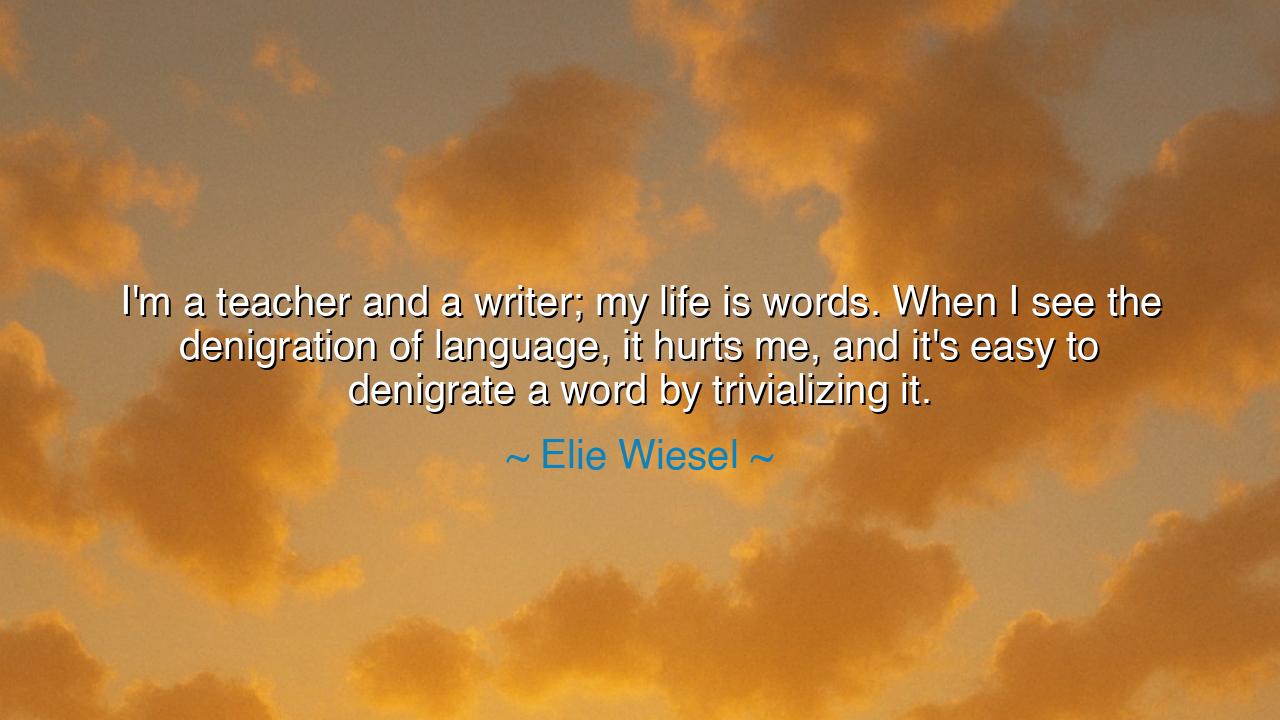
I'm a teacher and a writer; my life is words. When I see the
I'm a teacher and a writer; my life is words. When I see the denigration of language, it hurts me, and it's easy to denigrate a word by trivializing it.






Hearken, O children of wisdom and the written word, to the solemn reflection of Elie Wiesel, whose life was devoted to bearing witness and teaching: “I’m a teacher and a writer; my life is words. When I see the denigration of language, it hurts me, and it’s easy to denigrate a word by trivializing it.” In these words lies a meditation upon the sacred power of speech and writing, upon the responsibility inherent in the use of language, and upon the pain wrought when words, once vessels of truth, are treated with carelessness or scorn.
The essence of this teaching is that language is the instrument of human conscience. To trivialize a word, to strip it of meaning, is to diminish its capacity to convey truth, justice, and memory. Wiesel, whose writings arose from the shadow of atrocity, understood that the precision and respect of language is not merely aesthetic, but moral. Words carry the weight of thought, memory, and moral responsibility; their misuse can distort perception, erode understanding, and wound the human spirit.
Consider the historical example of George Orwell, whose works such as 1984 warn of the manipulation of language to enslave thought. Terms were twisted, euphemisms obscured reality, and truth became malleable. Orwell, like Wiesel, recognized that language is inseparable from the health of society. To denigrate a word is not a harmless act; it is an invitation for falsehood to take root and for the human soul to be deceived.
Wiesel’s reflection also illuminates the role of the teacher and the writer as guardians of language. A teacher shapes the mind and moral compass of the student, instructing in the subtle power of expression, clarity, and thoughtfulness. A writer preserves memory, testifies to truth, and channels the human experience into enduring form. Both callings demand vigilance: the protection of words from trivialization, and the cultivation of respect for their meaning.
Even in our modern age, the denigration of language persists. Words are tossed lightly, reduced to memes or slogans, or stripped of context to amuse or deceive. Wiesel’s anguish at this trivialization is a warning: to misuse a word is to impoverish thought, diminish empathy, and erode the capacity to communicate the deepest truths. His life reminds us that words, like sacred vessels, require care, reflection, and respect.
The teaching extends to personal conduct. To speak, to write, to name, is to act morally. Every word carries potential to heal, enlighten, or harm. Wiesel, whose life witnessed the consequences of silence and falsehood, understood that ethical responsibility begins in the very choice of words. To denigrate a word, to trivialize it, is to abdicate moral responsibility and participate in the erosion of truth itself.
O children of expression, take this teaching to heart: honor the words you inherit, the words you speak, and the words you write. Guard them from trivialization, choose them with care, and use them to illuminate, to remember, and to testify. The power of language is sacred; to respect it is to uphold the integrity of thought, morality, and memory.
Thus, let the words of Elie Wiesel echo through your days: your life is words, and every utterance carries weight. Protect language from denigration, wield words with purpose and conscience, and honor the power they bear to shape thought, transmit truth, and preserve the memory of human experience. In doing so, you become a steward of understanding, a guardian of wisdom, and a voice for the enduring dignity of all.
If you wish, I can also create a practical guide for safeguarding the integrity of language, inspired by Wiesel’s reflection, showing daily exercises to cultivate careful, meaningful, and ethical communication. Do you want me to do that?






AAdministratorAdministrator
Welcome, honored guests. Please leave a comment, we will respond soon